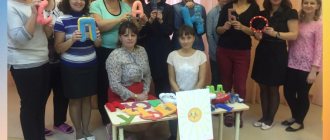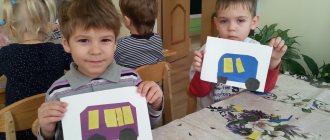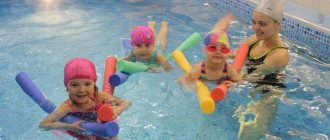The main forms of organizing work with children with speech impairments at the speech therapy center of a preschool educational institution are individual, subgroup classes and classes in small groups.
The predominant form of correctional work in the preschool educational institution’s speech center is individual lessons, because the use of this form of work allows you to successfully establish contact and understanding between the speech therapist and the child. The duration and frequency of individual lessons is determined by a specialist and depends on the severity of disorders of the articulatory apparatus and delays in speech development. Typically, individual lessons last no more than 20 minutes and are held twice a week.
The main goal of an individual lesson is: selection of complex exercises aimed at eliminating specific disorders of the sound side of speech.
The purpose and objectives of educational work in a speech therapy group
Educational work in a speech therapy group differs from educational work in a regular preschool group in that it is interconnected with correctional activities that are organized with children with various speech disorders.
In addition, children of the logogroup quite often, in addition to speech deviations, also have minor developmental deviations. Based on these characteristics, educational work should be built. Note 1
The goal of educational work in the speech therapy group: comprehensive and complete development of preschool children, taking into account their age and individual capabilities and needs.
Objectives of educational work:
Are you an expert in this subject area? We invite you to become the author of the Directory Working Conditions
- Children's assimilation of generally accepted rules and norms of behavior.
- Achieving stable results in mastering the general education program.
- Formation of moral and aesthetic qualities of the individual.
- Developing skills to maintain and strengthen one’s own health and the need for a healthy lifestyle.
- Formation of stable communication skills for successful interaction with others.
- Organization of an effective subject-development environment that promotes the overall development and personality development of preschool children, as well as the full development of speech.
Achieving the set goals and objectives of educational work in the logogroup is carried out through the professional activities of the teacher. That is why it is important that all teachers working with children constantly improve their knowledge and skills by studying pedagogical and methodological literature, attending advanced training courses and familiarizing themselves with the practical experience of their colleagues.
Interaction between teacher and speech therapist
The implementation of the entire complex of correctional training in speech therapy requires a combination of special training for the correction of speech deficiencies with general program requirements. A special daily routine has been developed for speech therapy groups, which differs from the usual. The speech therapist conducts frontal, partly group and individual classes. In addition, the schedule provides time for classes according to a comprehensive program for preschool children (“Development”, “Rainbow”, “Childhood”, etc.): mathematics, speech development and familiarization with the outside world, ecology, drawing, modeling, sports and music classes. In addition, in the evening, the teacher works with subgroups or individual children on speech correction (development) in accordance with the instructions of the speech therapist. The tutor plans his work taking into account the requirements of both the standard general program and the speech abilities of the children and their progress in overcoming the correction program conducted by the speech therapist, in accordance with the nature of the speech disorder.
In this regard, it is necessary to ensure interaction and continuity in the work of the teacher and speech therapist in the speech therapy group. The teacher must know the main directions of the auxiliary program, the age and individual characteristics of the language education of preschoolers, understand the pronunciation features and lexical and grammatical aspects of the language, take into account the language abilities of each child in school and extracurricular activities.
Together with the speech therapist, the teacher plans activities for speech development, familiarization with the outside world, learning to read and preparing hands for writing. Continuity in the work of a speech therapist and teacher means not only joint planning, but also the exchange of information, discussion of the results of children’s work, both in speech and in other types of activities. All this is recorded in a special notebook.
Thus, the teacher of the speech therapy group carries out a pedagogical and complex of corrective measures, the essence of which is to eliminate deficiencies in the sensory, affective-volitional, and intellectual spheres caused by the characteristics of the speech defect. At the same time, the teacher pays attention not only to correcting existing defects in the child’s development, enriching ideas about the environment, but also to further developing and improving the activities of safe analyzers. This creates the basis for the favorable development of the child’s compensatory capabilities, which ultimately affects effective language acquisition.
Technologies of educational work
Technologies of educational work in a speech therapy group:
Finished works on a similar topic
Course work Educational work in speech therapy groups 440 ₽ Abstract Educational work in speech therapy groups 270 ₽ Test work Educational work in speech therapy groups 190 ₽
Receive completed work or specialist advice on your educational project Find out the cost
- Gaming technologies are aimed at developing children's imagination, memory, attention, and speech. During the game, children have the opportunity to “assume” various roles, thereby learning to build relationships with other children and interact in a team. Gaming technologies are one of the most effective educational tools, since play for preschool children is the leading activity.
- The technology of integrated classes is a complex of different classes combined into one on equal terms. Integrated educational activities contribute to the development of children's moral qualities, aesthetic feelings, spiritual and moral sphere, creative potential, etc. That is, classes of this plan allow the teacher to significantly save time and at the same time obtain high educational results.
- Computer technologies are one of the most effective ways to increase motivation and individualize the educational process. When using computer technologies in educational work, the teacher is given a unique opportunity to create an interesting and educational lesson, a favorable emotional background and the all-round development of children. Classes using ICT are always interesting and exciting, and therefore the effectiveness of the educational impact on children is much higher.
The educational work in the speech therapy group firmly includes correctional classes on speech development. This is due to the fact that the development of speech in such a group is the leading direction that “permeates” all educational activities. Based on this, educational work is carried out not only in its “pure form”, but also in the process of implementing correctional classes on speech development, as well as at special moments.
The organization of educational work in a speech therapy group is carried out in the following forms:
- Group – work with several children, having a specific goal set based on the existing educational problems of these children.
- Individual – aimed at working with a specific child, based on his age characteristics and educational needs.
- Collective – work with the whole group, taking into account the characteristics of this category of children.
Methods and techniques of educational work in the logogroup:
- reproductive method: exercises, demonstration, explanations;
- verbal methods: conversations, riddles, reading, poetry, etc.;
- partial search methods: observation, examination, experimentation, research, etc.;
- project method: work on projects (short-term, long-term);
- a variety of techniques aimed at creating situations of success.
Classes with a speech therapist. Materials and notes.
Contained in sections:
- The work of a speech therapist. Speech therapy 8289
Includes sections:
- Differentiation and automation of sounds 4051
By groups:
- Senior group
- Preparatory group
- Middle group
- Junior group
Showing publications 1-10 of 9447. All sections | Speech therapy classes
New
Photo
The best
Consultation for educators “Organization and conduct of physical education classes with elements of logorhythmics in a preschool educational institution” Organization and conduct of physical education classes with elements of logorhythmics in a preschool educational institution Specialists studying children with general speech underdevelopment (R.E. Levina, G.V. Chirkina, T.B. Filicheva and others note the need for an integrated approach to the education and upbringing of children with speech pathology...
Technological map of a speech therapy lesson with elements of experimental activities in a preparatory group Abstract to the technological map of a speech therapy lesson in a compensatory group preparatory to school for children with STD.
The development of speech and thinking are interconnected. Speech is a form of communication between people, characterized as a process of reception, processing and...
Specifics of the work of a teacher in a speech therapy group
Compensation for a child’s speech defect, his social adaptation and preparation for a further school career require mastering, under the guidance of a tutor, those types of activities that are provided for in the programs of a mass general kindergarten. The teacher should pay special attention to the development of perception (visual, auditory and tactile), mnemonic processes, accessible forms of visual-figurative and verbal-logical thinking and motivation.
An important aspect of work in a speech therapy group is the development of cognitive activity and cognitive interests of children. It is necessary to take into account the peculiar delay in the formation of cognitive processes in general, which is formed in children under the influence of underdevelopment of speech, narrowing of contacts with others, inadequate methods of family education and other reasons.
Correct, pedagogically sound interaction between a teacher and a speech therapist, who combine their efforts in the interests of correcting children’s speech, is based on creating a friendly, emotionally positive environment in a speech therapy group. The psychological atmosphere in the children's team strengthens children's self-confidence, helps smooth out negative feelings associated with speech impairment, and creates interest in learning. To do this, the educator, like the speech therapist, must have knowledge in the field of developmental psychology and individual psychophysical differences in preschool children. They must be able to understand various negative manifestations of children’s behavior and promptly notice signs of fatigue, exhaustion, passivity and lethargy. Properly organized psychological and pedagogical influence of the teacher in most cases prevents the occurrence of persistent unwanted deviations in behavior and creates a team of friendly, socially acceptable relationships in the speech therapy group.
The work of a teacher on speech development in many cases precedes speech therapy training, prepares children to perceive material in future speech therapy classes, creating the necessary cognitive and motivational basis for the formation of speech knowledge and skills. In other cases, the teacher concentrates on consolidating the results achieved by children in speech therapy classes.
The task of the teacher of the speech therapy group also includes daily monitoring of the state of children’s speech activity during each period of the correction process, checking the correct use of sounds assigned or corrected by the speech therapist, acquired grammatical forms, etc. The teacher should pay special attention to children with a late onset of speech activity, with a complex medical history and psychophysiological immaturity. The teacher should not focus children's attention on the appearance of possible errors or stuttering in speech, repetition of the first syllables and words. Such manifestations should be reported to a speech therapist. The teacher’s responsibilities also include good knowledge of the individual characteristics of children with general speech underdevelopment, who react differently to their defect, to difficulties in communication, to changes in communication conditions.




